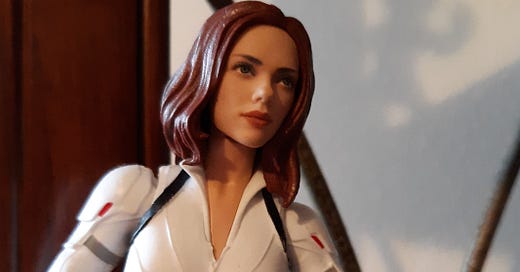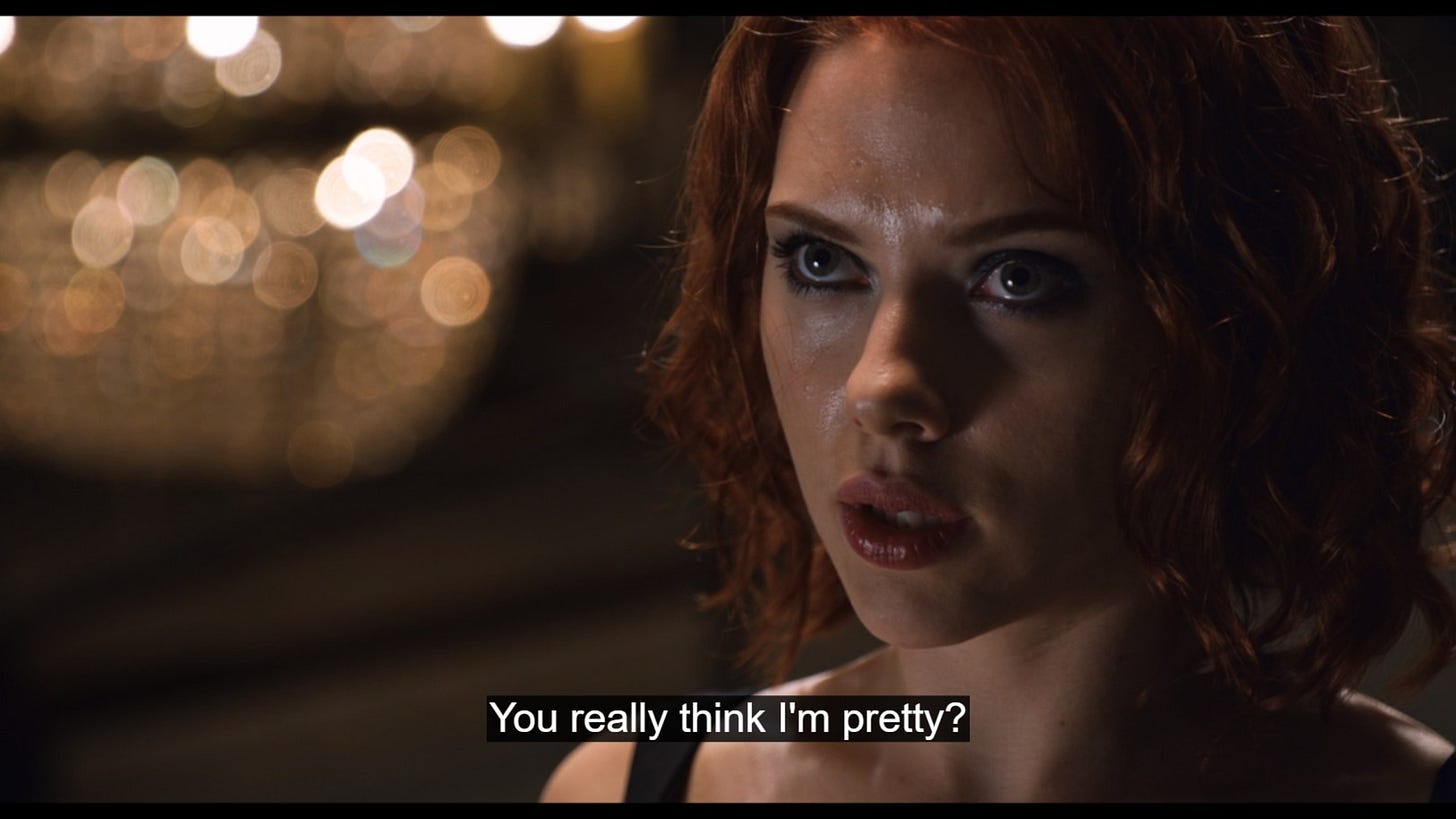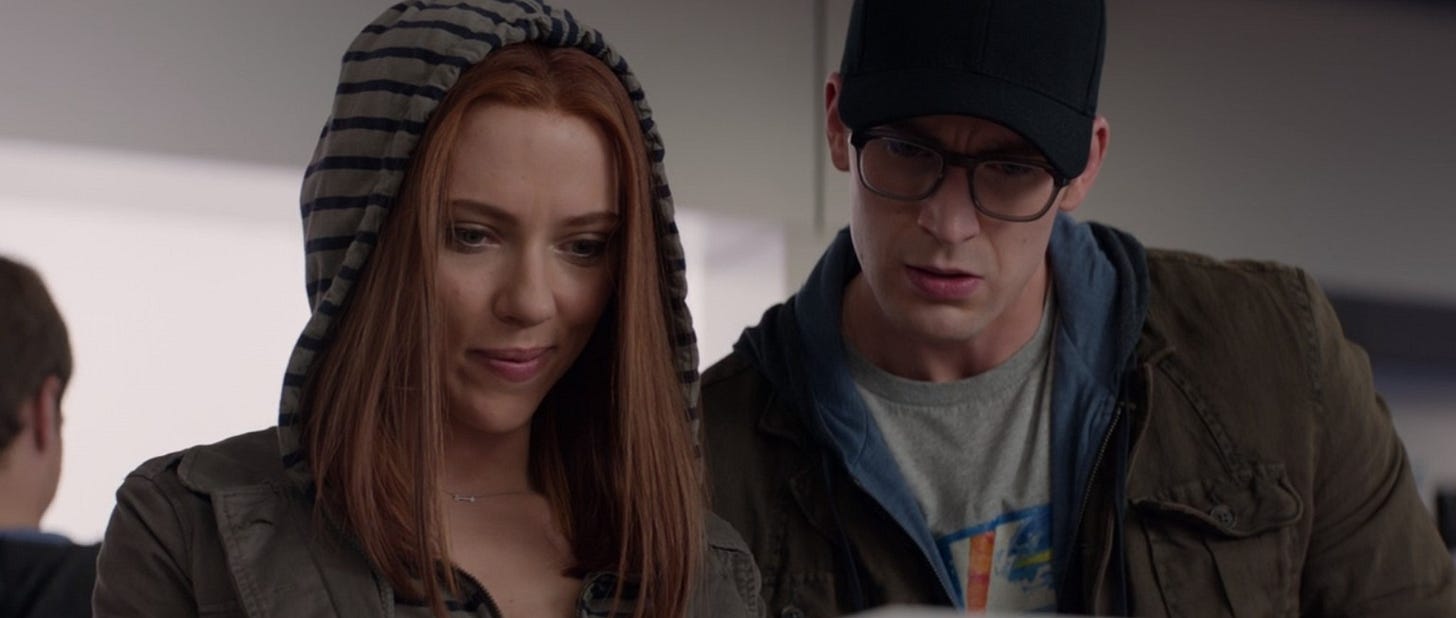As someone who enjoys superhero movies while bristling at their recent monolithic cultural dominance that sometimes crosses over into entitlement, it’s easy for me to think of Black Widow as the culmination of a years-long missed opportunity. Scarlett Johansson’s super-spy character has been in the Marvel Cinematic Universe for 11 years, a span of time during which the MCU has completed full trilogies about her teammates Captain America and Thor, as well as a trilogy-plus about their collective adventures as the Avengers. This new movie is her first solo effort, and probably her last, unless Johansson can be lured back for more prequels or into an alternate universe.
Part of me hopes against all my instincts that she can be, though I wish more that she hadn’t been dispatched so stupidly in Avengers: Endgame. Johansson’s introduction back in 2010’s Iron Man 2 is auspicious in what now probably reads as the “wrong” way—her short first scene involves her pretending to be Natalie, a notary from the Stark Enterprises legal department who Tony hires to replace newly promoted Pepper Potts on the basis of Natalie having additional, searchable experience as a lingerie model. But while her quick ascent to series-highlight territory with The Avengers made that intro look all the cheesier and male-gaze-y, there are other shifts in the series that make Black Widow’s debut notable in retrospect.
For example: It’s a Marvel movie that allows Natasha to introduce, however vaguely, the possibility of sex—not because she’s designated the Girl Avenger, but because sexuality figures into so many of Johansson’s performances (see Under the Skin, Her, Lost in Translation, Marriage Story—say, is she a terrific actor?!), contra a recent, pointless controversy over whether it was disgusting for a male critic to describe the distinctive sultriness of Johansson’s famously sultry voice. It’s also harder to begrudge the Black Widow Mark 1 costume knowing it was designed by the same woman who worked with Johansson on her looks in movies as diverse as Ghost World (Rebecca’s transition from hipster fashions to normcore) and Hail Caesar! (the fish ass). (As for director Jon Favreau casting himself as “guy ogling Johansson’s form as she changes in the backseat of the car he’s driving,” well... it’s upfront, I’ll give him that.)
Still, a crucial component in the 2012 team-up The Avengers was that it added depth and shading to characters who hadn’t experienced successful MCU showcases—like the Hulk, Hawkeye, and, especially, Black Widow. Which is not to say her second turn is out of the problematic woods just yet, because some of that characterization must be chalked up to writer-director Joss Whedon. Natasha Romanoff’s first scene in The Avengers—facing interrogation only to take a phone call, break cover, and flip her secret-agent power back on like a switch—is a corker, and striking in comparison to her climactic moments in Iron Man 2. Fun stuff, that hallway melee that fully introduces Black Widow the SHIELD-backed ass-kicker, but, as mentioned, unavoidably the product of male fantasy (and—despite its novelty compared to the neutered likes of Ant-Man and the Wasp, not very inventive fantasy, no matter how hard I fall for it, mysteriously extra-curled hair and all). Throughout Iron Man 2, Johansson is forced to enact a caricature of her own performance style, past and then-future; the characterization leans heavily on her come-hither opacity. Even when she finally unleashes her epic multi-henchman beatdown, she’s striking a series of action-figure poses. In The Avengers, she’s a person: rueful, capable, deadpan, a scrappy Company Woman whose personal secret mission is paying down the “red in her ledger” from her previous life as a ruthless assassin. At his best, Whedon delivers turns of phrase like that, dialogue-as-character so memorable that the best some of his successors can do is repeat it.
Of course, any admiration for Whedon’s rep as a writer of Strong, Complicated Female Characters now feels more lingering than abiding, impossible as it is to separate from the allegations of his manipulative and abusive behavior from a position of power. For that matter, Whedon’s work on 2017’s Justice League—in addition to being professionally ruinous, cruel-sounding, and just not especially good—highlighted his Sorkin-esque predilection for tics and self-plagiarism. Most irritating is his evident preference for writing toward the One Smart Girl Playing with the Boys dynamic in superhero fiction. The cutesy moment where Gal Gadot’s Wonder Woman jokingly laments that she “works with children” in response to the relieved post-battle giddiness of Superman and Cyborg is a chilling reminder that one Whedon’s go-to moves separate the girls and guys in his superhero team-ups is to call the girl mommy for a minute, in between ogling her supernatural beauty. It’s a reminder rather than a revelation because it knocks off Black Widow’s note that she’s “always picking up after you boys” in Whedon’s earlier Avengers: Age of Ultron, the Avengers movie that even many of the Marvel diehards won’t particularly defend.
Which brings us to one of the most-hated moments from one of the most-hated, and possibly best, Avengers movie.
It is, unsurprisingly, also tied up in motherhood. Natasha, having begun some manner of off-screen flirtationship with part-time Hulk Bruce Banner (Mark Ruffalo) in between the first movie and the second, has a heart-to-heart with the not-so-big, not-so-green guy in a moment of retreat where the Avengers hide out with Hawkeye’s family. Positioned as a cool aunt, she greets Hawkeye’s wife and kids warmly, and these moments of rattled, post-battle quiet later inspire a conversation with Banner where they each lay their emotional cards on the table. It’s a sequel of sorts to their first scene together in the first Avengers, where Natasha tracks down Bruce to recruit him, and in their tense chat, they let slip little bits of information about their checkered pasts. Notably, Natasha’s assurance that it’s “just you and me” is quickly disproven; in Age of Ultron, it really is just them. Bruce talks about his uncertainty over what comes next, now that the world has gotten a look at the Hulk unleashed (he’s just been subdued from a hallucination-induced rampage). Natasha offers to run away with him, as the movie strings along their relationship’s ambiguity: They’re intimate, but have they, you know… been intimate? (Like so many bits and pieces of the first half of the MCU, this bittersweet not-quite-romance would be later codified into the house style: All the superheroes seem to be in a perpetual state of recent, off-screen break-up. They all become de facto Captain Americas, capable of sexual desire but burying it in ice.) Bruce insists that Natasha has no future with him, because he can’t settle down; Natasha confesses that her “graduation” from her assassin training as a youngster involved forced sterilization. It made her job easier, she says, including killing. “You still think you’re the only monster on the team?” she asks.
Guys, people hate this scene. And I understand why: It ties Natasha’s humanity to her ability to reproduce. In light of Whedon’s cutesy mommy bullshit, it’s especially discomfiting, an easy confirmation that no matter how he professes to see female characters in three dimensions, he ultimately knows how to flatten them back onto the page with his powerful wit (and maybe tried to do that in real life, too). Yet as easy as it is to read this as a “tell,” the worst interpretation of this scene has never been my read of it. Natasha isn’t saying she’s a monster because any woman who can’t reproduce has no other purpose; she’s saying she’s a monster because she traded away that choice for the sake of killing. Bruce can turn into a gigantic green rage monster. Natasha has presumably killed dozens of people. To read Natasha’s grief over this, the established red in her ledger with an ongoing physical manifestation in her own body, as the movie calling her worthless for inability to get pregnant seems like a willful misunderstanding.
Which sucks, because “Joss Whedon is misunderstood!!!” is not what I’m going for here. I wouldn’t even say it’s an elegantly handled scene—or relationship, really, which is more the problem than anything else. Despite all that, Johansson does nice work with the breathing room afforded her; she’s present enough that it almost feels like Natasha is working out why she feels such affinity for Bruce in real time. Is there some kind of hidden justification there, with Whedon as the brilliant monster and the women he treated abominably as the tragic professionals? Ugh!
And yet: This scene lives on for me, beyond its Whedonliness, shapeshifting like Black Widow’s hairstyles.
Changing hairstyle for different, unknowable moods: relatable! She and Hawkeye are the ones on the team without superpowers or a supersuit, and the merest glimpses into Black Widow’s shadowy past or mysterious hairstyle preferences or uncertain future make her, paradoxically, appear more human. She never gets a full origin story; even the new movie limits its backstory. After an effective and lengthy opening flashback, it consigns Natasha’s training to an opening-credits sequence and her defection from Russia to the U.S. to dialogue.
So in both text and visuals, Black Widow is a little bit different than her more mythical teammates—given that the parameters of the MCU remain fairly tight, regardless of superhero or filmmaker. In his two Avengers movies, Whedon shoots her repeatedly with the camera on its side, skewing the usual low-angle hero shot into a full 90-degree tilt, as if the movie doesn’t know quite what to make of her. That’s especially well-deployed in the Russo Brothers’ Captain America: The Winter Soldier, where her aloofness puzzles and frustrates Captain America (Chris Evans) just as it becomes indispensable to him. Her work and personal life are linked more inextricably than anyone else on the Avengers team, even Cap; it’s a sad state of affairs, but probably sort of a familiar one, too, for any number of working women (which may make the supposed politics of her reproductive issues sting a bit more). The other Avengers chafe at teamwork and/or the modern world because they stand out, often in gendered ways: Tony Stark is a genius, Captain America is a man out of time, Thor is a god among men, Bruce Banner is a genius and a creature of horror. As impossibly beautiful as Johansson can be, Natasha has made a career of blending into a variety of systems. Metatexually, it’s also why the character plugs into a number of mid-period MCU movies so well.
That’s something that the later Avengers movies miss about Natasha (or maybe just don’t have time for, lacking filmmakers who would fight for that Ultron breathing room). But Endgame touches upon it before killing her off with what it imagines to be a noble sense of arc-closing heartbreak. Before all that, we see the various original Avengers coping with a post-Thanos world, where half the population has been snapped away. Natasha is the one minding the store, so to speak, eating peanut butter sandwiches and receiving briefings from a talking raccoon. Her lack of fully explored mythology makes her a more grounded superhero.
That’s one reason her conversation in Age of Ultron doesn’t bother me, and why I was surprised and pleased to find out that Black Widow circles back to the sterilization issue. Here, Natasha’s sort-of sister and for-sure replacement Yelena (Florence Pugh) goes into more explicit detail about the forced hysterectomy she and Natasha both experienced; her delivery is both aggressive and flip, a bite-back at their self-absorbed father figure (David Harbour) who likes to think of himself as the Red Guardian—a cheap Russian knockoff of Captain America. The movie does plenty of MCU stuff. It constructs a quippy surrogate family; it makes intrauniverse references and a few self-referential asides; it inexplicably throws those characters onto a massive airship as if the CG mechanics of flight were mastered a long time ago, as opposed to never. But director Cate Shortland, the first woman to ever solo-direct a Marvel Studios movie (two-dozen titles and 13 years into its existence!), seems willing to follow the characters into their corners of this cinematic universe, rather than bringing the party to them, so to speak. Matching Natasha’s juxtaposition of noticeable stylings and a spy’s ability to blend, her movie looks and feels different—or different enough, anyway—from the Russo Brothers template that has become such a burden on other recent entries.
I’ve read a few reviews hinting that Johansson’s characterization here feels inconsistent or even secondary here, a combination of a character often getting the short shrift, and the movie’s desire to set up Pugh’s character for future Widowing. It’s true that there are mere glimpses of the femme fatale from Iron Man 2, the dry wit of The Avengers, or the pragmatism with a teasing attitude from Captain America: The Winter Soldier. The movie even kids her action-figure tendencies, as Yelena repeatedly calls Natasha a “poser” for her dramatic battle stances, which may be the most consistent element of her character across eight movies. (It’s difficult to tell whether Yelena is meant to be misinterpreting what it means to call someone a poser, or if the screenwriters flat-out don’t know what it actually means. Anything can happen in the MCU!)
Yet the shifty nature of Natasha’s character is her throughline, especially with Johansson playing her. As mentioned, I hope we’ve been able to dispel the notion that she’s a limited actor, given the range of emotions she accesses in Marriage Story alone. As with a lot of post-Golden Age stars, Johansson has been ascribed limitations that are actually part of her persona, and Black Widow is nearly as neat a fit for that persona as Downey’s version of Tony Stark. Plenty of people, some smart and some just me, have written about how many of Johansson’s signature roles find her transcending humanity, space, and/or time. Nothing in Black Widow matches that stunning scene in Lucy where she, in the midst of a terrifying, drug-assisted transformation into an all-powerful being, calls her mother and tearfully recalls childhood memories she shouldn’t be able to access. But there’s something deeply touching about her grappling with her status as a deadly action figure, and sorting through the illusions of family she’s been briefly granted. Of course she doesn’t behave with Tony Stark’s clockwork consistency, making incremental changes on a plainly visible character arc. Shortland and her screenwriters seem to get that Natasha is the most human Avenger because of her capacity for reinvention.
Reinvention is something that the MCU purports to pride itself on—this is a movie series that will soon reach 30 entries, after all, with a rotating cast of characters and stars that varied wildly in general-public recognition prior to their entrance into the great almost-equalizer—and also something that it appears to be a source of discomfort, whether conscious or not. The post-Whedon movies, for example, seem intent on calling back to his ideas and even his lines: This year alone, we’ve had jokey riffs on Loki being “burdened with glorious purpose” and, yep, the red in Black Widow’s ledger. Is this the MCU’s way of dismissing Whedon’s showy overwriting, or are the newer filmmakers attempting a salvage job, taking whatever memorable pieces they can find and rehoming them in less interesting, but also less problematic, projects?
Much as I enjoyed it, Black Widow qualifies there: It’s less problematic in its talented director and in its relatively tame thematic concerns, and I’d also say it’s ultimately less interestingly weird than Age of Ultron. But I think one reason I respond to this movie and this character is the combination of opacity and unruliness that’s hard to tame, even with all of the MCU formulas at the filmmakers’ disposal and Johansson’s considerable composure. Consciously or not, Shortland creates continuity with the past lives of Natasha Romanoff, even those she lived under the direction of Whedon: No 90-degree tilts, but a handful of mirror shots that recall bits and pieces of her Avengers appearances, and, more hilariously, several shots that unavoidably make her butt a focal point, a discomfiting Whedon signature. (Maybe, in the spirit of the Red Guardian’s obsession with his status as Russia’s answer to Captain America, the movie is simply calling back to a beloved line from Endgame and staking out Nat as Russia’s ass.) If she’s my favorite Avenger, does this make her officially a Problematic Fave, or does it just make me problematic? (Something else to consider: My inability to get really mad about Johansson saying some vaguely dumb stuff about who gets to play which roles as an actor!)
Either way, it may better explain the bittersweet feeling I experienced as the highly enjoyable Black Widow ended and sent its heroine off to an eventual, certain death—and not satisfaction that her character would meet a dramatically satisfying demise in Endgame. Partially because I fucking hate the clumsy, arbitrary mechanics of her Ultimate Sacrifice, yes. But partially because it feels like an unnecessary course correction, away from a character who makes her colleagues feel a little more programmatic. The best parts of Black Widow aren’t the moments where puzzle pieces fall into place. They’re the moments where Johansson’s face somehow maintains its air of unknowable mystery, even as emotion overtakes her. They’re the reminders of off-screen mistakes that can’t be hero-worshipped away.






